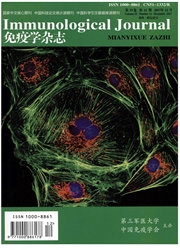

 中文摘要:
中文摘要:
目的 研究mfg12反义质粒对暴发型肝炎小鼠体内mfg12表达的改变,以及对小鼠暴发型肝炎病情发展的影响。方法为了建立一个有效的体内基因转移系统,分别于感染前1d和当天尾静脉高压注射LacZ质粒,第1天收集小鼠肝脏标本,并做X-gal染色观察质粒在肝脏的转染效率;用同样的方法将mfg12反义质粒转入MHV-3感染的Balb/cJ小鼠肝脏,对照组用空载体代替。观察两组动物生存率,并于感染后第2天收集肝脏标本,HE染色观察肝脏病理组织学改变,免疫组化方法和RT-PCR方法检测mfg12 mRNA和蛋白的表达水平。结果尾静脉高压注射可以使得目的基因在小鼠肝脏达到20%的转染效率。基因治疗组小鼠于感染后第2天mfg12 mRNA和蛋白表达均明显下降。MHV-3感染后,对照组小鼠3d内全部死亡。而基因治疗组33%的小鼠存活10d以上。显微镜观察基因治疗组小鼠肝组织坏死轻微,而对照组肝组织有大片坏死。结论mfg12反义质粒可以明显抑制mfg12基因的表达,并且显著提高暴发型肝炎小鼠的生存率。
 英文摘要:
英文摘要:
Objective To investigate the effects of mfg12 anti-sense plasmid on the mfg12 expression and the progress of hepatitis in mice with MHV-3-induced fulminant hepatitis. Methods An efficient in vivo gene transfer system was established by transferring the lacZ gene expression plasmid to Balb/cJ mice through hydrodynamic injections at one day before the infection and the infection day. Liver samples were collected and X- gal staining was performed at one day after the infection. The mfg12 antiseuse plasmid were delivered to Balb/cJ mice by hydrodynamic injection at one day before the infection and the infection day in MHV-3 infected Balb/cJ mice, whereas Balb/cJ mice in control group received empty plasmid, and then the survival rates of the mice in the two groups were observed. Liver samples were collected at 2 day post MHV-3 infection. The pathological change was observed by using HE staining. The mfg12 expressions at both mRNA and protein levels were measured by Immune histochemistry and RT-PCR. Results Hydrodynamic injections could transfer DNA into mouse liver cells efficiently with transfer efficiency of 20%. In gene therapy group ( mfg12 anti-sense group) mfg12 mRNA and protein decreased markedly at day 2 post injection. All mice in control group died in 3 days post MHV-3 infection, whereas 33% mice in gene therapy group survived more than 10 days. In addition, mild hepatocyte necrosis was observed in mice liver of gene therapy group, but confluent liver necrosis was observed in mice of control group. Conclusion Mfg12 anti-sense plasmid significantly inhibits the expression of mfg12 gene in vivo and markedly improved the survival rate of MHV-3 infected mice.
 同期刊论文项目
同期刊论文项目
 同项目期刊论文
同项目期刊论文
 期刊信息
期刊信息
